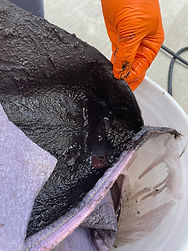
Fuel Polishing Professionals

Water, Condensation & Rust
Heavier than fuel is found under the fuel at the tank bottom.
Bacteria & Fungi
Heavier than fuel but lighter than water and will be found at the fuel/water interface as shown in the photo.
As much as 90% of the upper fuel in a storage tank may not be contaminated if left undisturbed.
CONTAMINATED DIESEL FUEL
Contaminated fuel can damage your engine. Today’s diesel engine manufacturers call for fuel to meet or exceed ISO cleanliness levels of 18/16/13 with a water content of less than 0.05%. Not long ago diesel engines were simple and inefficient. They emitted smoke, and burned high sulfur fuel which contained as much as 5,000 parts per million of contaminants. The older diesel injection systems only used about 1⁄2 the fuel pressure modern engines do, and older injectors send the fuel through much larger passages. If there was a little moisture in the storage tank, the high sulfur content killed most of the filter clogging bacteria and fungi. Today’s diesel fuel is ultra-low sulfur, about 15 parts per million, which allows filter clogging bacteria and fungi to grow rapidly if any moisture is in the fuel storage tank. Modern diesel engines use high pressure, 27,000 to 35,000 psi fuel injectors with tiny fuel passages which are easily clogged with dirty fuel and damaged by water. The old-style fuel filters and gravity water separators that remove 75% to 99% of the contamination are not sufficient for today’s diesel engines. Magnets and filter-less devices won’t clean fuel to ISO 18/16/13 or remove water to less than 100 PPM.
Five Reasons to Clean Diesel Fuel Tanks

1
Eliminate Downtime:
Damage to fuel injection systems are costly in time and dollars
2
Stop Emergency Service Calls:
Clogged filters and water in fuel will ground your fleet until help arrives.



3
Prevent Emergency Generator Shutdown:
Gen-Sets sit idle for most of their life, water will accumulate and microbe contamination will grow at the tank bottom.
4
Reduce Fuel Tank Corrosion:
Acidic sludge accumulates in fuel tank bottoms from microbe clusters.
5
Increase Engine Performance:
Clean, dry fuel helps your engine run smoothly.




